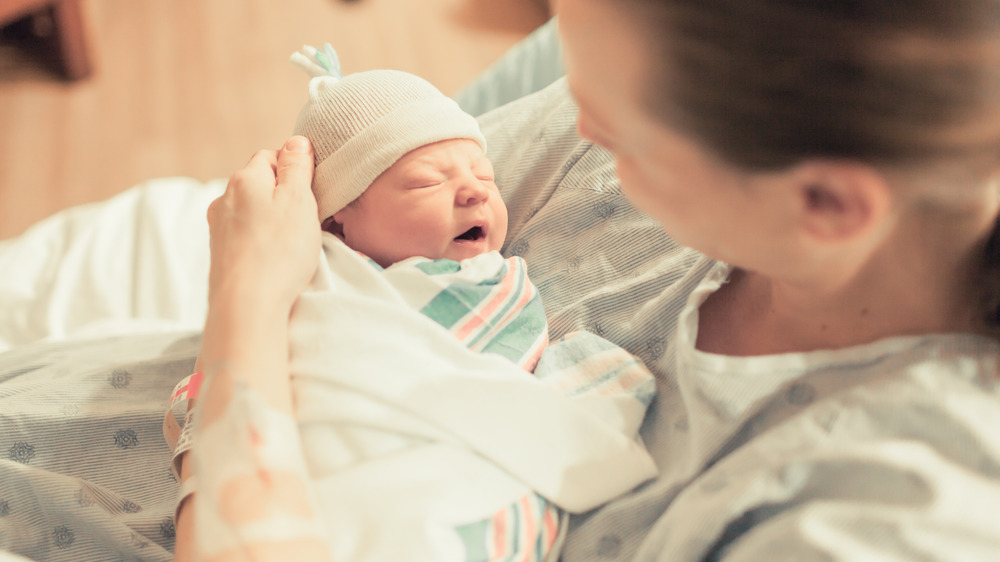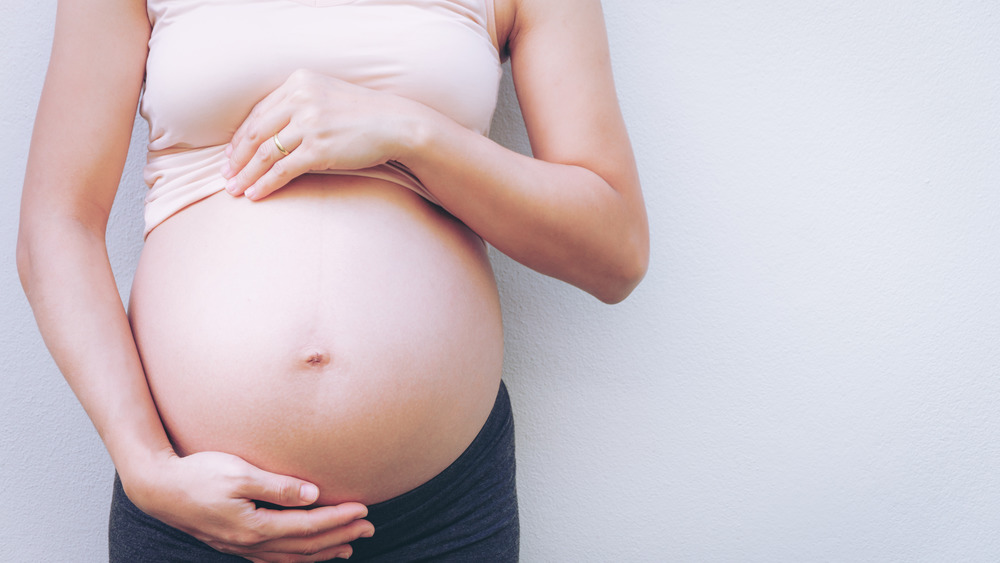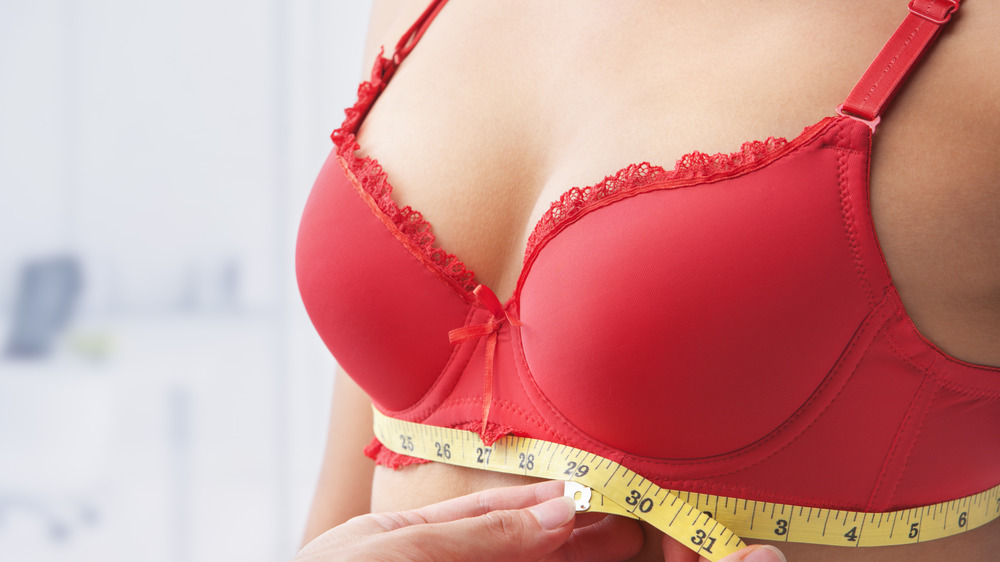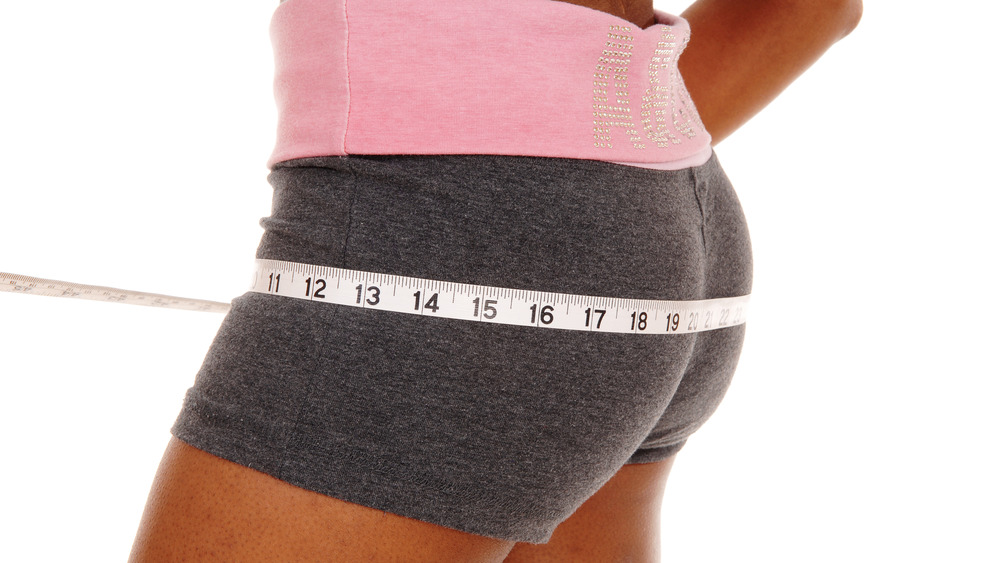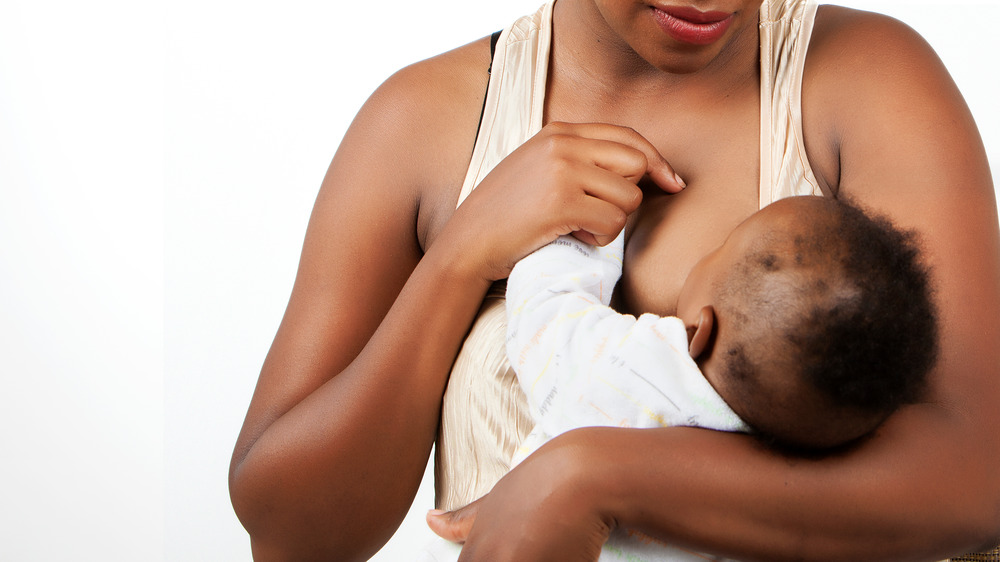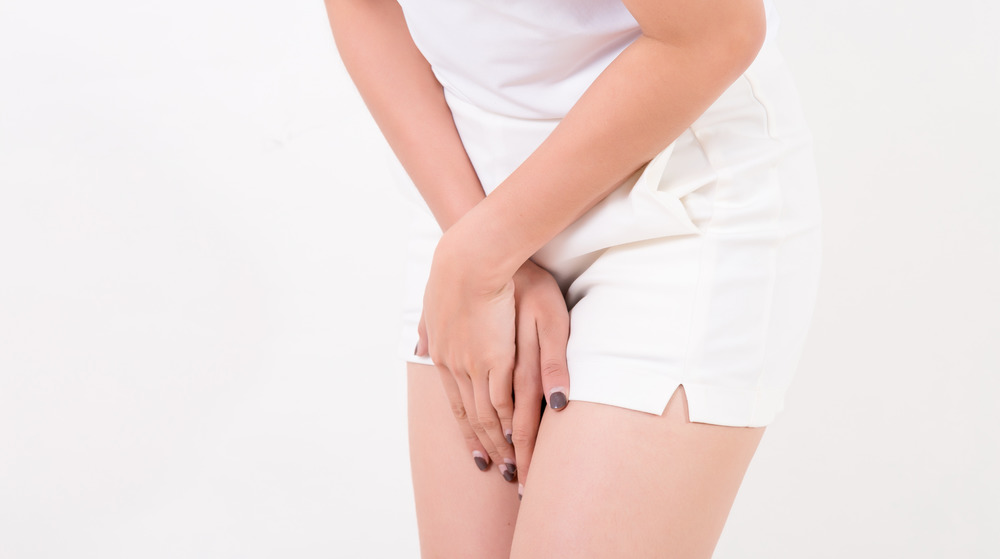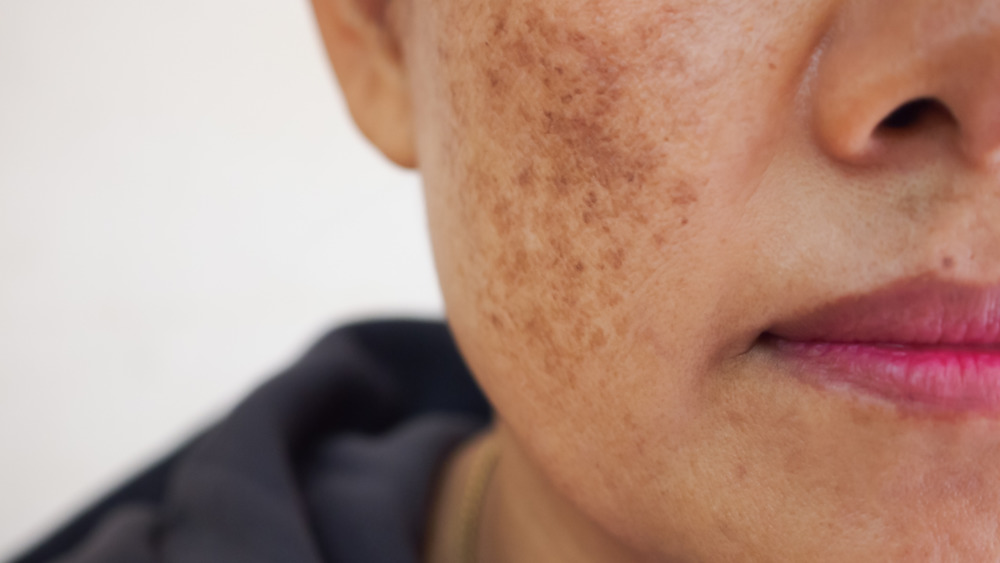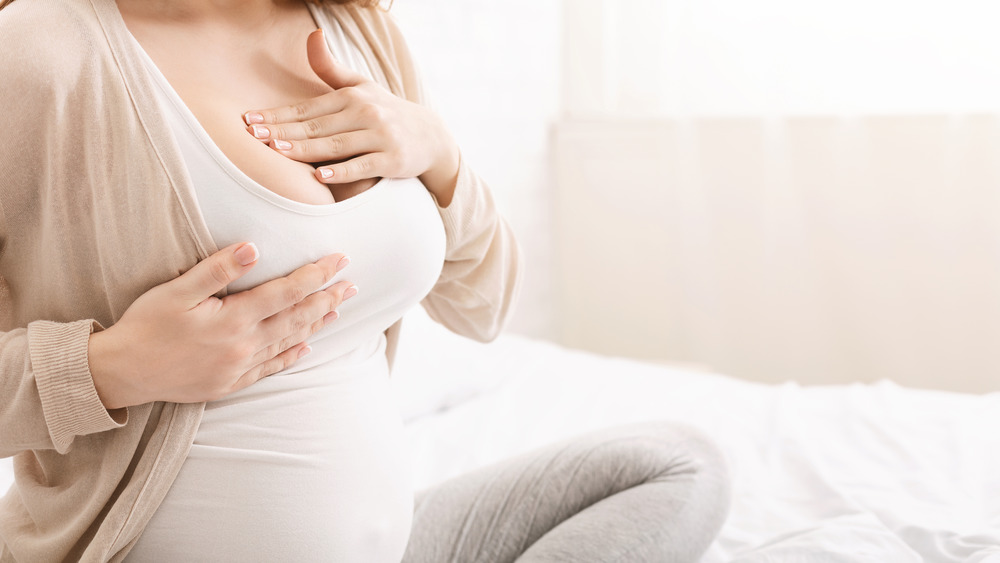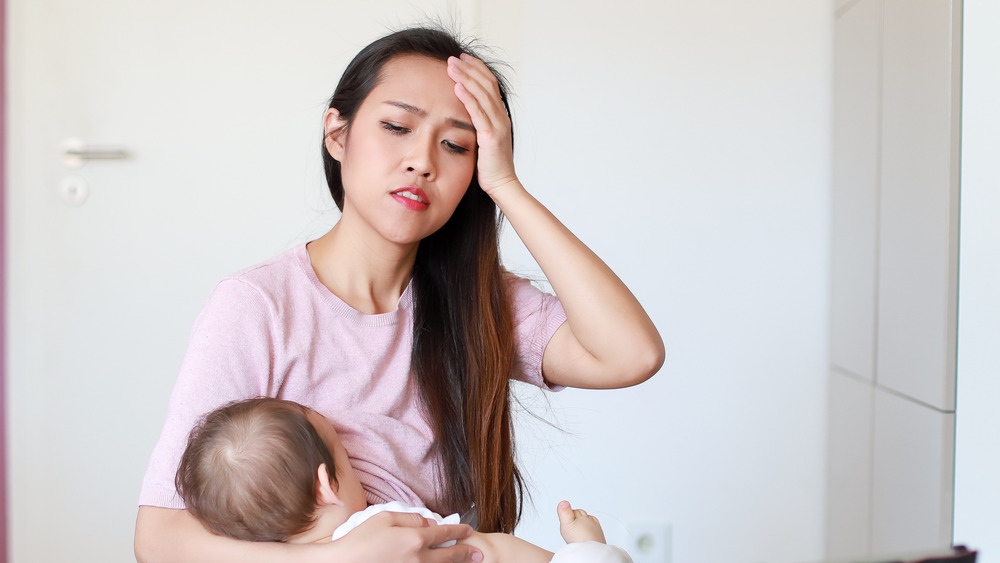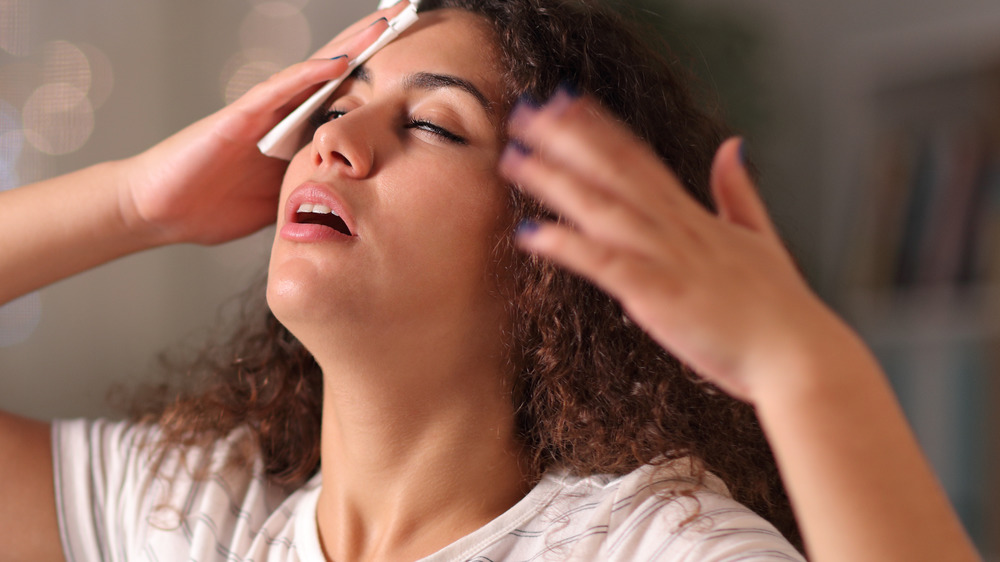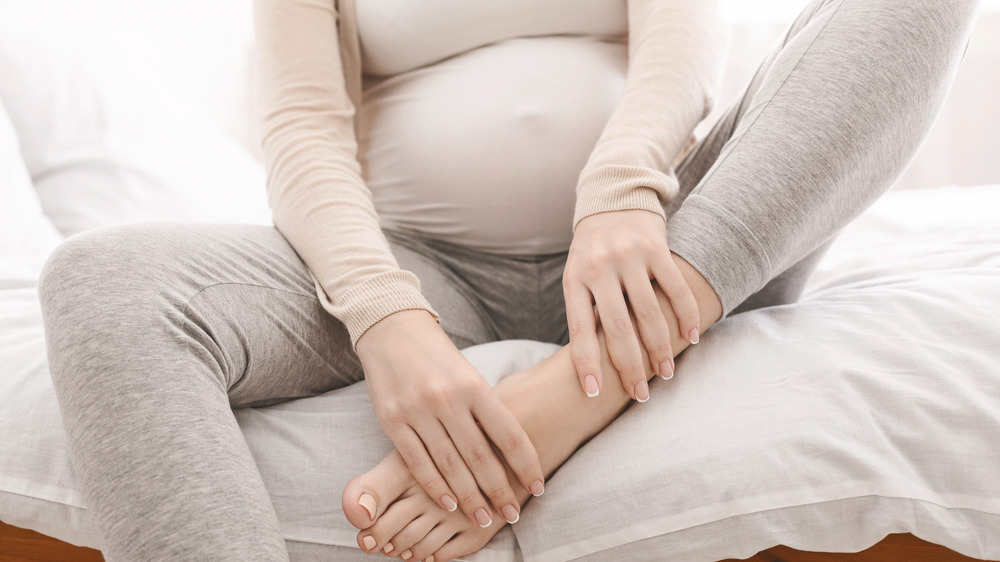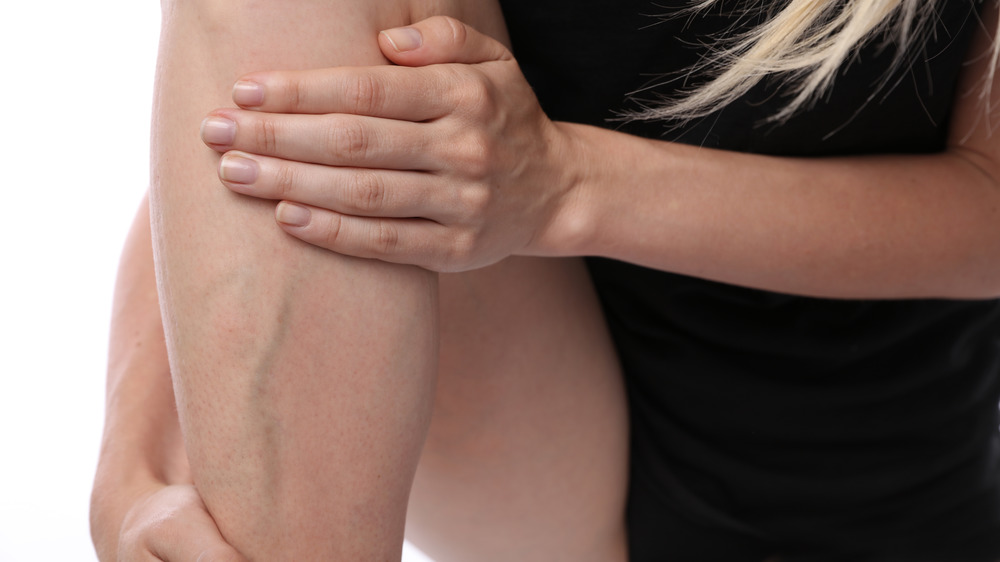Surprising Things That Happen To Your Body After Giving Birth
After giving birth, surprising things happen to your body. The media often minimizes the effects of pregnancy on celebrity bodies (via Michigan Quarterly Review). However, notwithstanding the sheer speed at which some celebrities are portrayed as having "gotten their bodies back" with their post-baby makeovers, the fact is it's essentially a myth that getting your pre-pregnancy body back is even possible. "Having a baby profoundly changes your body," OB/GYN Cynthia Wesley told Health Digest. While you can try your best to get back to an approximation of your pre-pregnancy body, it's way more complicated, than, say, merely going on a diet.
In fact, many of the changes that happen to a woman's body as a result of pregnancy and giving birth have literally nothing to do with weight gain. Even those changes that might appear to be attributable to "weight gain" may have more to do with structural changes the body undergoes in order to accommodate and nurture growing a tiny human in one's abdomen. Nor are they limited to the abdomen. So let's get real, shall we? Let's take a look at the surprising things that can actually happen to your body after giving birth.
After giving birth, your waist may never be the same again
Considering the average newborn weighs between five and 10 pounds, your abdomen must stretch a lot to accommodate a full-term pregnancy. In fact, there's so much stretching that some women develop stretch marks (via American Academy of Dermatology), but you probably already know that. Per Healthline, what may be surprising to learn, and what many people don't necessarily talk about, is that some 60 percent of pregnancies result in "diastasis recti," wherein the rectus abdominis (the vertical muscle running along the front of the abdomen) splits in half vertically, according to OB/GYN Betsy A.B. Greenleaf.
This separation of the two halves of the rectus abdominis can translate into a larger waist circumference that all the dieting and sit-ups in the world will not remedy, Dr. Greenleaf told Health Digest. For some women, the gap is so wide, there's a risk of abdominal hernia (via the website of Christopher K. Livingston, MD), but it can be repaired surgically. In less severe cases, postpartum diet and exercise can minimize the resulting "poochy" appearance, according to board-certified gastroenterologist, Dr. Sutha Sachar.
Pregnancy with a side of... extra ribs?
Even if you don't experience diastasis recti, and regardless of how pregnancy changes your breasts, you may notice your dresses and tops fitting differently even after shedding all the pregnancy pounds. The reason is that pregnancy will often cause the rib cage to expand, according to OB/GYN Pari Ghodsi, via Health. The reason is that during pregnancy, your body starts producing increased levels of a hormone called relaxin. Relaxin is produced by the ovaries and the placenta, according to Your Hormones, and helps your ligaments — which connect your bones — to loosen, according to Spectrum Health's Health Beat. Among other things, this allows your pelvis to expand to accommodate your baby's delivery and your rib cage to expand to accommodate your growing uterus.
Although you cease to produce such high levels of the hormone after delivering your baby, your rib cage may never go back to its pre-pregnancy circumference. The surprising effect of giving birth on the rib cage isn't one of the most talked-about pregnancy topics, but it's a real thing, according to moms, like actress, Busy Phillipps, who issued a "public service announcement" on the topic on Instagram.
There's a reason your hips may be wider after giving birth
Did you ever hear a woman say that she carried her baby in her "hips"? She's not kidding, nor is she exaggerating. The reason is that the bones comprising the hips can spread during pregnancy to accommodate the weight of the fetus, including helping a pregnant woman to retain her center of gravity, according to women's health expert and Paragard spokesperson, Dr. Shieva L. Ghofrany. "Even if your weight goes back to normal, those bones may never return precisely to their pre-pregnancy arrangement," Dr. Ghofrany told Health Digest.
Also affecting the hip circumference and shape after giving birth is the fact that during labor the body produces hormones, including relaxin, which allow for the ligaments that hold the pubic bones together, to relax, with the effect being that the bones are able to, and do, spread wide enough to allow a baby's head to pass through, according to board-certified OB/GYN Betsy A.B. Greenleaf. This is true even if the labor progresses to a C-section, and "while these hormones return back to normal weeks after childbirth but the hips may still remain spread," Dr. Greenleaf told Health Digest.
Breastfeeding your baby can lead to weird uterine twinges
"One of the more surprising experiences a woman may encounter after giving birth is feeling uterine contractions while breastfeeding their babies," according to Risa Klein, the director of midwifery at Lenox Hill Hospital in New York City. This is known clinically as "involution," and it helps the uterus (which is a muscle, by the way) to shrink back down to size. In fact, Klein pointed out to Health Digest that one of the many benefits of breastfeeding is that it is "nature's way" of helping bring the uterus back into its non-pregnant state.
Some women are shocked when they first experience these sensations, said Klein, who also pointed out that it would be great if more women were told about these sensations in order to mentally prepare themselves for what is to come. The contractions are usually not painful, but they can be intense, and in some cases, women will experience significant discomfort. Klein recommended speaking to your healthcare provider before taking any medicines for pain relief, especially if you're breastfeeding.
Pain or no pain, the good news is that breastfeeding is associated with the release of the "love hormone," oxytocin!
Giving birth can and often does lead to urinary incontinence
"Have you ever heard of a woman saying she has had difficulty holding in her urine since giving birth?" asks board-certified OB/GYN Betsy A.B. Greenleaf? "Like, she can't do jumping jacks or sneeze without peeing just a little?" The reason, Dr. Greenleaf told Health Digest, is that pregnancy can damage the ligaments that support the urethra, which is the tube through which urine exits the body from the bladder. The result is called "stress incontinence, which is leaking of urine with a cough, laugh, or sneeze." And you don't have to give birth vaginally for this to happen, Dr. Greeleaf added. "Just the weight of pregnancy can cause these injuries."
That being said, some post-natal women may benefit from pelvic floor physical therapy, according to doctor of physical therapy, Rachel Gelman. "Pelvic floor PT can help address any musculoskeletal impairments that are causing stress incontinence," Dr. Gelman told Health Digest.
Don't be surprised if you find yourself with skin changes during or after pregnancy
A lot of people don't realize that pregnancy and the hormones associated with it can and do cause changes to the skin, gynecologist and reproductive health expert for Intimina, Dr. Alyssa Dweck, told Health Digest. "Pigment changes can happen everywhere, leading to dark patches on the skin, but many women also notice the areola and the labia are darker as well. When those changes appear on the cheeks of the face, the scientific term is "melasma," OB/GYN Dr. Cynthia Wesley told Health Digest. Commonly referred to as the "mask of pregnancy," melasma can reverse after delivery — but not always.
Another thing to consider about pregnancy and its after-effects is that the hormones involved may be responsible for changes to moles and other growths on the skin, according to the Cleveland Clinic. But as normal as pregnancy-related changes to moles can be, they should not be dismissed as mere side-effects of pregnancy. Melanoma is the most commonly diagnosed cancer during pregnancy, accounting for "31 percent of all malignancies among expectant mothers" (via Science Daily).
Your vagina goes through surprising changes, even if you deliver via C-section
Well, here's a side-effect of pregnancy that people sometimes joke about, but many may not realize is actually a thing. The vagina goes through many changes as a result of pregnancy, labor, and delivery, leading some women to note that the diameter of their vagina has increased. "As doctors, we refer to this as laxity, but many women complain that their vagina feels like an open cave after delivery, OB/GYN Betsy A.B. Greenleaf told Health Digest. Unfortunately, this can lead to "decreased enjoyment of sexual activity and decreased orgasmic response."
In addition, there is the possibility of post-delivery feelings of "vaginal pressure," or a sensation of having to urinate or poop even if one's bladder or rectum is empty, according to women's health expert and Paragard spokesperson, Dr. Shieva Leila Ghofrany. This can happen even after a C-section. The reason is that it's not necessarily due solely to the stretching of the vagina related to a vaginal delivery. Rather, some of the changes may be hormonally-driven and may be linked to the relaxing of ligaments in the pelvic area, Dr. Ghofrany pointed out.
Shortly after delivery, your breasts may start to feel rock-hard
Lots of women (and men) joke about how pregnancy gives small-breasted women a chance to experience what it's like to have large breasts. But this is not really accurate, according to women's health expert and Paragard spokesperson, Dr. Shieva Leila Ghofrany. What's really happening is that throughout pregnancy, your breasts are transforming into milk-producing machines, according to Medela, whose website points out that "during this time, your milk ducts increase in number and complexity, and begin branching into an increasingly intricate feeding system. Simultaneously, milk-producing cells called lactocytes start developing within your breasts. And the amount of blood flowing to your breasts doubles during pregnancy – which is why you may see the veins through your skin." In other words, a pregnant woman's breasts do become bigger during pregnancy, but they don't really resemble the large breasts of non-pregnant women.
And that's just during pregnancy. After delivery, your breasts start actively producing milk. When the milk starts to come in, it tends to do so suddenly, leaving your breasts feeling rock hard and sometimes quite painful, Dr. Ghofrany told Health Digest.
Sometimes, breastmilk production can lead to an infection called mastitis
"One of the most surprising things I learned when I became a midwife nurse practitioner," Fadwah Halaby revealed to Health Digest, is that as natural as breastfeeding is, that doesn't mean that it can't lead to pain and discomfort for new moms. In fact, it can even lead to a condition known as "mastitis," which is breast inflammation caused by an infection originating from a milk duct, according to Halaby. Around 10 percent of women experience mastitis in the first month after giving birth, according to a 2015 study published in the journal Breastfeeding Medicine.
Symptoms of mastitis can include a sensation of heat in the affected breast, fever, chills, body aches, and even swollen axillary lymph nodes (the lymph nodes in the armpit adjacent to the affected breast), according to Michigan Medicine. The good news mastitis is easy to resolve (and with something as simple as cabbage leaves, according to Healthline) and has been shown to have little effect on breastfeeding outcomes (in other words, it only rarely leads a woman to switch to bottle-feeding).
Your surprisingly lush head of hair will go surprisingly flat after giving birth
Pregnant women are known for their lush, shiny hair, and it's not just because of the prenatal vitamins (which, by the way, you can start taking even before trying to get pregnant), according to OB/GYN Shieva Leila Ghofrany. "During pregnancy, elevated hormone levels increase the ratio of growing hair to resting or shedding hair. The result is often an extra-lush head of hair." The Mayo Clinic explains it thusly: after you give birth, it's payback time. for up to five months following delivery, you will experience hair loss that will reverse those lush pregnancy effects.
The hair loss can be extreme, as demonstrated in this video. The reason it can continue for up to five months postpartum is that as soon as you give birth, all of the lush hair growth you experienced during pregnancy reverses itself, but it can take up to five months for each of your hair follicles to be affected by your body's sudden decrease in pregnancy hormones, Dr. Ghofrany explained to Health Digest.
It shouldn't surprise you to experience hot flashes after giving birth
"Hot flashes are the most common symptom of menopause," as revealed by the National Women's Health Network, but they are also a common symptom following pregnancy, according to OB/GYN Shieva Leila Ghofrany. In fact, 29 percent of women experience post-pregnancy hot flashes, according to a 2013 study published in the journal Fertility and Sterility. Dr. Ghofrany told Health Digest that postpartum hot flashes are actually caused by the same thing that causes menopausal hot flashes, which is a drop in estrogen levels. The longer you continue to nurse your baby, assuming you've opted to nurse, the longer you may continue experiencing hot flashes because breastfeeding may delay the return of the menstrual cycle (which would bring estrogen levels back to pre-hot-flash levels), per Healthline.
Hot flashes can happen in the middle of the night, thereby disrupting sleep. They can also happen at other times. Regardless of when they happen, hot flashes may be uncomfortable, but when associated with the postpartum period, they're nothing to worry about unless accompanied by actual fever and chills, in which case, you may wish to consult your physician, according to Dr. Ghofrany.
A wider rib cage? And wider feet?
As if it weren't vexing enough that you may not be able to coax the circumference of your waist, hips, and/or rib cage back down to where they were prior to pregnancy, OB/GYN and Paragard spokesperson, Shieva Leila Ghofrany told Health Digest that your feet may also increase in size during pregnancy — with no intention of ever returning to their prior daintiness.
"Around the end of the second trimester of pregnancy, you'll probably notice that you're retaining quite a bit more water than you were accustomed to retaining prior to your pregnancy," according to Dr. Ghofrany. "Many women have to remove their wedding ring at this point, and they may notice that their shoes are starting to feel tighter. But whereas you'll probably be able to slide your wedding ring back on soon after giving birth, your feet could well remain a size or two bigger indefinitely." The reason may be that the extra weight of pregnancy causes pressure on the feet, which may flatten the arches, resulting in your feet measuring wider and/or longer, per LiveScience.
You may get varicose veins in expected and unexpected places
Did you know that your blood flow and cardiac output increase significantly during pregnancy? That's what family practitioner Dr. Jessica Edwards told Health Digest. That, in and of itself, may come as a surprise to some, but it also leads to an even more-surprising postpartum change to the body: varicose veins. "Varicose veins are swollen, twisted veins that you can see just under the skin" (via MedlinePlus). Varicose veins can often be observed in the legs of pregnant and postpartum women as a result of the pressure the baby in the uterus applies to the large vein that carries blood from the feet and legs back to the heart (i.e., the inferior vena cava), according to Kids Health. Perhaps it won't be surprising then to learn that varicose veins are also a common side effect of obesity.
Varicose veins can also occur in the anus and rectum. When they do, they are known as hemorrhoids. "External hemorrhoids" are those that form under the skin around the anus. "Internal hemorrhoids" are those that form in the lining of the anus and lower rectum.
Not tonight, honey, I have a headache
Many women report a significant increase in libido during pregnancy, according to Healthline. Unlike increased waist, hip, and rib cage circumference, this particular increase is notorious for not lasting after delivery. The reason is that the hormones that caused libido to increase during pregnancy, and particularly, estrogen, quickly diminish in the wake of the baby's delivery. Another reason, as well as a notable independent complaint of postpartum women, is headaches. In fact, 39 percent of all women experienced a headache within the first week after delivery, according to a 2011 study published in Continuing Education in Anaesthesia Critical Care & Pain. As research presented at the 2007 Clinical Meeting of the Society for Maternal-Fetal Medicine revealed, the average time for onset of a postpartum headache was found to be 3.4 days after delivery.
Like a decrease in libido, postpartum headaches may be caused by rapidly diminishing hormone levels (via Healthline). As the body adjusts to postpartum hormone levels, postpartum headaches may be the result of stress, lack of sleep, and dehydration, all of which are known to go along with parenting a newborn.

